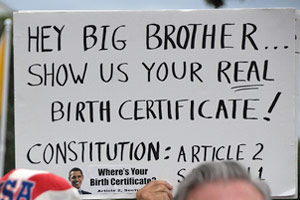
Flickr/<a href="http://www.flickr.com/photos/_saturnine/3626733619/">paparatti</a>
The birthers have a plan to end Barack Obama’s presidency—and in Arizona, they’re making progress.
Last week, Arizona state Rep. Judy Burges, a Republican, introduced a bill that would bar presidential candidates who do not prove they were born in the United States from appearing on the ballot in the Grand Canyon state. And state Rep. Chad Campbell, the top Democrat in the GOP-controlled Arizona House of Representatives, tells Mother Jones that the bill is likely to pass. It was introduced with 25 co-sponsors in the House and 16 co-sponsors in the state Senate; the measure needs 31 votes in the House and 16 in the Senate for approval. “Will it matter?” asks Campbell. “We’ve started a tradition here of passing legislation that is political grandstanding or that sets up litigation.”
But the birthers—those ardent Obama foes who believe the president was not born in Hawaii and, thus, is not constitutionally qualified serve as president—see this measure as more than symbolic. For them, it’s part of a well-orchestrated campaign to deny Obama reelection.
It’s not that Obama necessarily requires Arizona’s 10 electoral votes to win reelection in 2012. In 2008, he lost there to John McCain, Arizona’s senior senator (though in 2012, Obama could make a play for the state). More important, Burges’ bill—which would establish a strict standard for proving natural-born citizenship (which the birthers presume Obama could not meet)—is a model for other states, and similar efforts are under way in Pennsylvania, Missouri, Montana, Georgia, and Texas. (Obama won Pennsylvania in 2008 and lost Missouri by less than 4,000 votes.) Arizona may be where this birther ball gets rolling.
Last year, Burges introduced a similar measure that stalled in committee. Her new one is much tougher. The original bill would have set up a system under which a presidential candidate would have to document his or her citizenship to be listed on the state ballot. Here’s how it would work: The national political party would submit an affidavit from its presidential candidate in which the candidate states his citizenship, and this affidavit would have to be supported by “documents that prove that the candidate is a natural born citizen.” Arizona’s secretary of the state would then review the affidavit and supporting documents, and if there were “reasonable cause to believe the candidate does not meet the citizenship” requirement, the secretary of state would be able to keep the candidate off the ballot.
This system left discretion to the secretary of state. And Burges’ original bill did not specify what documents would be acceptable. Consequently, the certification of live birth that the Obama campaign produced in 2008 might well qualify as sufficient documentation under that measure.
Burges’ new version raises the bar. It notes that the affidavit must be accompanied by “an original long form birth certificate that includes the date and place of birth, the names of the hospital and the attending physician and signatures of the witnesses in attendance.” (The other documentation required would include a list “that identifies the candidate’s places of residence in the United States for the preceding fourteen years.”) And the law states that if the candidate fails to submit these records, the secretary of state “shall not” place his or her name on state ballot.
There’s no wiggle room: Produce a long-form birth certificate, or no ballot-listing. That certification of live birth issued by the Hawaiian government would not count. (Two weeks ago, radio personality Mike Evans said he had been told by Hawaii Gov. Neil Abercrombie that no original birth certificate could be found for Obama—a remark that lit up the birther community—but this past week, Evans said he had been misunderstood. Meanwhile, Hawaiian legislators have introduced a bill charging anyone requesting Obama’s birth records—meaning that certification of live birth—$100, in order to cut down on birther requests.)
Burges’ bill, if passed, would have to be signed by Republican Gov. Jan Brewer to become law, and, if enacted, could well face a court challenge. It would establish a hard-and-fast criterion for all presidential candidates.
But what if a candidate does not have a long-form version of his or her birth certificate, and the state where he or she was born could not locate a copy—say, it was lost in a fire, or simply misfiled? Would he or she be out of the running? The law also demands the candidate produce an “original” long-form birth certificate. Does that mean a copy wouldn’t suffice?
Birthers are ecstatic about the Arizona move. “It could be a game-changer,” declares WorldNetDaily, a conservative site run by Joseph Farah, a leading birther. “Imagine if just one or two states adopt such a measure before 2012,” Farah says. “Obama will be forced to comply with those state regulations or forgo any effort to get on the ballot for reelection. Can Obama run and win without getting on all 50 state ballots? I don’t think so.” In the past, Farah has put up billboards around the country asking, “Where’s the birth certificate?”
Campbell complains that the Arizona measure is “not based on an factual evidence. I’m trying to figure out the thinking behind this bill. I can’t. It’s just another conspiracy.” But the strategic intent is clear: maintaining the marginalized birther movement. Numerous lawsuits filed by the birthers have failed in the courts. Last month, Lt. Col. Terry Larkin, an Army doctor who refused to be deployed to Afghanistan because he questioned whether Obama was born in the United States, was dismissed from the Army and sentenced to six months in prison for refusing his orders. And last year, a Republican birther bill in the US House of Representatives fizzled.
Yet the birthers are charged up about this new battle plan: using GOP-dominated state legislatures to pressure Obama to produce a long-form birth certificate. A win on this front in Arizona will not in and of itself scuttle Obama’s reelection (assuming no such document for Obama can be produced). But it will certainly encourage birthers in other states to follow suit—and to keep their hope, and conspiracy theory, alive.















